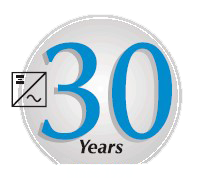Frequency inverters change Direct Current (DC) into Alternating Current (AC). Most frequency inverters fall into three broad design categories: sine wave inverters, modified sine wave inverters, and square wave inverters. The significance and usefulness of these models is best understood when they are compared to each other — a comparison that typically begins with describing the difference between the respective waveforms of electricity the devices emit.
- Sine wave models emit a “pure” current shown as an undulating wave.
- Modified sine wave models emit a distorted current shown as a vaguely angular wave.
- Square wave models emit a highly distorted current shown as a square wave.
The harmonic distortion that modified sine wave inverters and square wave inverters produce is often talked about as a problem. However, this is based on the presumption that, in order to operate efficiently, equipment needs a smooth, sinusoidal current like the kind in the utility line. Many devices work fine when they receive current from modified sine wave models or square wave models. In general, equipment that works well with these models is relatively low-tech.
Inverters for High-Tech Equipment
Companies that try to use modified sine wave inverters or square wave inverters with equipment that requires less than 3% Total Harmonic Distortion (THD) to operate efficiently soon learn the value of sine wave inverters. Common examples of harmonic distortion that sine wave inverters eliminate are flickering and buzzing in fluorescent lighting ballasts, lines rolling across the screens of televisions or computers, and buzzing noises emanating from high-tech speakers.
Because modified sine wave models and square wave models typically cost less than sine wave inverters, companies that need to minimize investments in the electrical infrastructure are interested in purchasing them instead of models that emit a sine wave. However, before a device is purchased, the load characteristics of the building should be examined carefully. If elements of the load require sinusoidal AC, sine wave inverters should be implemented.
Need sine wave inverters?
If so, Exeltech can supply the equipment you need. Our industrial grade inverters are Level 3 NEBS certified and come with a Restriction of Hazardous Substances (RoHS) Certificate of Compliance, and a TUV – TL9000 Certificate. For more information about our products and services, contact us today at (800) 886-4683, or click here to use our contact form.




